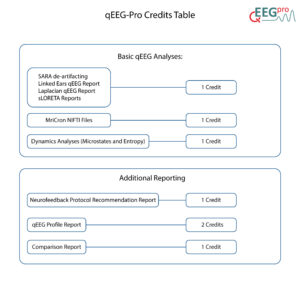1. Is the qEEG-Pro report service compatible with my EEG amplifier?
The qEEG-Pro report service can process .edf files from the following EEG amplifiers:
Brainmaster Discovery
Deymed TruScan
Freedom 24/20/10 (For Freedom 10 files, no sLORETA reports or Neuroguide reports can be generated)
MindMedia Nexus
Mitsar
Neurofield Q20
Neurosoft Neuron-Spectrum
J&J Neuronavigator (No Neuroguide reports)
Cognionics Quick 20
Natus XLTEK
Neuroscan
Neuracle (No Neuroguide reports)
Cadwell Easy 2
Cadwell Apollo (No Neuroguide reports)
EGI NA400
Memory MD NeuroEEG (No Neuroguide reports)
Medicom Encephalan-EEGR-19/26
Neuroelectrics StarStim
BeeMedic NeuroAmp
Elmiko ExG-32 and 1042 series
2. Do I need to de-artifact my raw EEG before I upload it to the qEEG-Pro report service?
No need to worry about de-artifacting yourself, just upload your raw EEG to the qEEG-Pro report service and the raw EEG will be automatically de-artifacted using S.A.R.A. It is also possible (but not recommendable) to upload de-artifacted EEGs and switch off S.A.R.A.
3. Does S.A.R.A use ICA in its de-artifacting procedures?
S.A.R.A does not use ICA, since ICA can distort phase relationships between electrode sites.
4. Is my client data safe?
All your EEGs will be processed anonymously. However, it is important to use codes instead of names when entering client information in our system.
5. Will my client’s data be used for research and/or development purposes?
In order to be able to use non-anonymized patient data, the patient would first have to be informed about the research and would then need to sign a writen informed consent form. Since qEEG-Pro cannot implement this procedure directly, it would not be ethical to use non-anonymized patient data. In the future, qEEG-Pro may use fully anonymized patient data for research and development. Before such a project starts, qEEG-Pro will reach out to qEEG-Pro account holders and explain the goal of the reserach and describe the anonymization process. Also, the research will comply with local and international laws, including data protection and privacy regulations like GDPR and HIPAA.
6. How do I request a qEEG Profile Report?
In order to request a qEEG Profile Report, you would need two fully processed EEGs (Eyes Open and Eyes Closed) and a measure of the symptoms of the client. This can be one of the two online questionnaires: the ‘Client Questionnaire (old)’ which is available for all qEEG-Pro subscriptions, the ‘Questionnaires’, which is a set of validated and normed questionnaires which are only available when you purchase the Psychological Assessment subscription and finally the ‘Therapist Rating’, which is a rating scale for the main pscychologal disorders and need to be filled out by the clinician.
When you have all the necessary information, you can navigate to ‘QEEG Profile Report’ in the menu and follow the steps.
7. How do I request a Protocol Recommendation Report?
In order to request a Protocol Recommendation Report, you would need a processed EEG (Eyes Open or Eyes Closed) and a measure of the symptoms of the client. This can be one of the two online questionnaires: the ‘Client Questionnaire (old)’ which is available for all qEEG-Pro subscriptions, the ‘Questionnaires’, which is a set of validated and normed questionnaires which are only available when you purchase the Psychological Assessment subscription and finally the ‘Therapist Rating’, which is a rating scale for the main pscychologal disorders and need to be filled out by the clinician.
When you have all the necessary information, you can navigate to ‘Protocol Toolbox’ in the menu and follow the steps.
8. What is the age range of the qEEG-Pro database?
The qEEG-Pro database conists of subjects ranged between 4-82 years of age. However, there are very few subjects between the age of 4-7 and 65-82 years of age. This is especially important when you want to do a qEEG analysis for very young patients (<7) since you will be comparing your patient with a mean and standard deviation that have been derived from a group of subjects with a significantly higher age range. Since the brain and qEEG measures are rapidly changing in these very young individuals, the qEEG results will not be valid. For eldery patients (>65) this will be much less of an issue since the brain only changes marginally in this age range.
